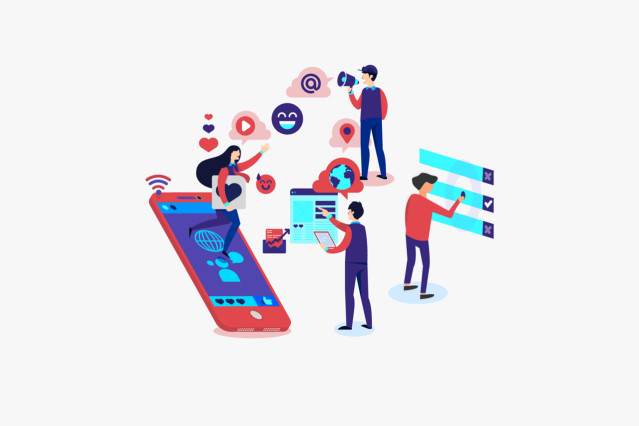Social Media
Why Do People Even Use Social Media?
We all have a basic drive to connect with others. Social media helps us do that.
Posted July 18, 2023 Reviewed by Devon Frye
Key points
- Self-determination theory explains our fundamental needs to feel connected, authentic, and accomplished.
- Research shows that social media helps people accomplish self-determination goals.
- When people’s social media use is based on their self-determined motivation, they feel happier.

It seems like social media apps are constantly making the news. From the CDC report about teen mental health earlier this year to the meteoric rise of the new Threads app this month, people seem constantly fascinated by the popularity of programs like Instagram and TikTok. Since their invention, these apps remain a fixation point in our discourse. Out of all the things that humans do around the world, social media sure grabs a huge share of our attention!
Maybe the burning question we really want to answer is: Why do people use social media in the first place? What’s the appeal? What do we really get out of it? What draws (literally) billions of people daily to these apps?
As with anything in psychology, there’s no one single easy answer. Some people use social media apps because they want to network professionally. Some want to be popular and get lots of affirmation (likes). Some want to laugh and make others laugh. Some want to promote an important cause, like a religious or political aspiration.
So, what’s the common thread (pun intended) with these goals? They’re all part of our quest to fulfill basic psychological motives.
Everyone Has Basic Psychological Needs
In previous pieces for this column, I argued that self-determination theory gives us a framework to deeply understand people’s fundamental mental needs, which are then translated into specific motivations and goals. On a very basic level, we strive to fulfill (a) competence, or the feeling that we can do things well, (b) autonomy, which involves developing authenticity and personal freedom, and (c) relatedness, which is fulfilled through social connectivity and bonding.
These motives get rendered into specific things like riding bikes, playing musical instruments or video games, learning facts about the world, having drinks with old friends, or getting a promotion at work. Just as we constantly desire physical things to sustain our bodies (food, water, sleep, exercise, and sex), we also have cravings for psychological things (achievement, excitement, and social alliances).
When we break down this array of psychological needs, social media use now seems much more intuitive. People use apps like Instagram or Threads because they want to accomplish their goals and satisfy their emotional necessities. This is one of the key insights from decades of psychological research and from user experience studies at big tech companies like Meta.
Research Evidence Links Self-Determination With Social Media
For instance, researchers in the U.S. and Australia observed a correlation between satisfying their relatedness needs and social media enjoyment. The more they felt like using social media helped them connect positively with others (“I really like the people I interact with on Facebook”), the more highly satisfied they felt with their social media usage (“I am satisfied with my experience on Facebook”). The researchers concluded that social media apps make people happy because they help fulfill a need for social connection.
In another study, researchers from Turkey and the U.S. examined daily social media use over two weeks. They asked participants about specific actions (scrolling, sharing, liking, and friending). The researchers observed that simply engaging in these online activities was totally unrelated to well-being, meaning that they didn’t make people feel better or worse.
But when participants were motivated to use social media because they found it beneficial in some way (“Because I thought that it was fun and interesting”), then their well-being did improve. That is, when social media use was motivated by authentic values and interests, then people reported feeling more vitality and were more satisfied with their life.
A recent study from researchers in the U.S. and Russia found a similar pattern. When people felt more “free,” and “connected” while using social media, this predicted higher well-being, compared to when they felt more “pressured” and “lonely.” The authors wrote that when people experience a self-determined motivation for their social media use, it “may deliver a distinct socio-emotional benefit” to their well-being.
They also conducted two experiments where they instructed participants to use a social media app of their choice in the laboratory. Participants completed surveys for self-determined motivation and emotional well-being both before and after using social media. The researchers replicated the same pattern as before—when participants felt that they were using social media to fulfill their psychological needs (particularly for social connection), they felt happier.
This explains why people are drawn to use social media in the first place. Humans have a fundamental need to feel connected, authentic, and capable. This could take many forms, of course. Maybe it’s sharing family vacation photos, posting job ads, or marveling at feats of athletic performance—or adorable kittens. But all of it really boils down to self-determination.
So then why does it seem like some people sometimes suffer because of their online activities?
Self-Determination Also Explains Bad Experiences Online
Dissatisfaction with social media can be explained by the same principles. People feel unhappy with social media (or texting and email, for that matter) when they feel like they’re being controlled. In other words, when people feel compelled to like and share posts, like they have no choice but to text someone back, or as if they must check their email, those are linked with suffering because the behaviors are driven by extrinsic goals.
Thankfully, few of us (if any) are forced to use social media. We do it because we enjoy it. If anyone was forced to log on and scroll through dozens of posts, it would lose all its appeal quite rapidly.
This is why I find the claims about social media causing poor mental health to be so baffling. All of the knowledge we have suggests the opposite is true. Even researchers who argue that sometimes people suffer while using social media will contextualize this within a more nuanced perspective than the oversimplified “social media is bad” narrative. Rather, they claim that social media benefits people’s mental health when it provides opportunities for belonging and meaningful social connections. But social media can hurt people’s mental health when it’s done for the wrong reasons.
Conclusion: Make Social Media Work For You
In conclusion, I would ask you, the reader, to be more mindful of this the next time you log on to your preferred social app. Ask yourself: What are your goals? What is your motivation? Are you trying to connect with friends, or promote your business, or learn cool science facts, or laugh at some clever memes? Whatever you’re craving, think about how you can accomplish that, and you will be more likely to feel a boost in your happiness and well-being.
References
Clark, J. L., Algoe, S. B., & Green, M. C. (2018). Social network sites and well-being: The role of social connection. Current Directions in Psychological Science, 27(1), 32-37.
Manuoğlu, E., & Uysal, A. (2020). Motivation for different Facebook activities and well-being: A daily experience sampling study. Psychology of Popular Media, 9(4), 456.
Sheldon, K. M., & Titova, L. (2023). Social media use and well-being: testing an integrated self-determination theory model. Media Psychology. DOI: 10.1080/15213269.2023.2185259
Wang, X., & Li, Y. (2016). Users' satisfaction with social network sites: A self-determination perspective. Journal of Computer Information Systems, 56(1), 48-54.




